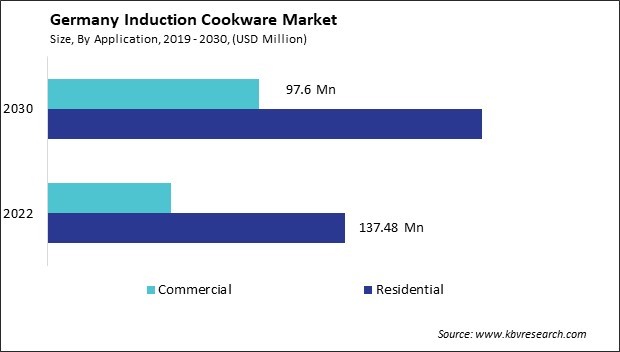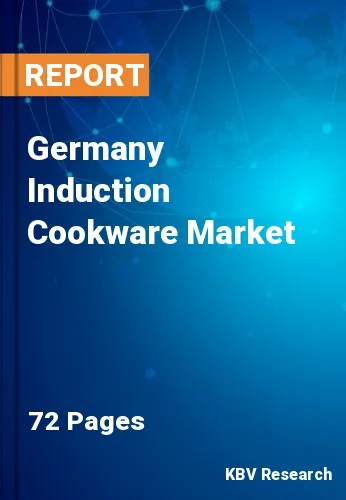The Germany Induction Cookware Market size is expected to reach $298.05 Million by 2030, rising at a market growth of 5.6% CAGR during the forecast period. In the year 2022, the market attained a volume of 2,454.75 Thousand Units, experiencing a growth of 5.6% (2019-2022)
The induction cookware market in Germany has witnessed significant growth over the years. Induction cookware consists of pots and pans specifically designed to be compatible with induction cooktops, which use electromagnetic energy to heat the cookware directly. This technology offers several advantages, including faster heating, energy efficiency, and a cooler cooking surface, making it safer and more convenient for German users.

Moreover, advancements in induction technology have led to improvements in the performance and functionality of induction cookware. Manufacturers in Germany are constantly innovating to develop cookware that maximizes heat distribution, minimizes heat loss, and is compatible with a wide range of induction cooktops. This continuous innovation has contributed to expanding the induction cookware market in Germany, as consumers seek out high-quality products that enhance their cooking experience.
Additionally, the growing urbanization and changing lifestyles in Germany have increased demand for compact and space-saving kitchen appliances, including induction cooktops. With its sleek and modern design, induction cookware is well-suited to smaller kitchen spaces commonly found in urban dwellings and apartments. This has further fueled the adoption of induction cooking technology and boosted sales of induction-compatible cookware in Germany.
Germany, known for its focus on sustainability and energy efficiency, has seen a surge in demand for induction cookware as consumers seek environmentally friendly and energy-saving alternatives. Additionally, the growing home cooking trend, especially during the COVID-19 pandemic, has further boosted the demand for induction cookware as more Germans spent time cooking meals at home. The COVID-19 pandemic has profoundly impacted the induction cookware market in Germany. With lockdowns and restrictions prompting consumers to stay at home, there has been a surge in home cooking activities.
The induction cookware market in Germany has witnessed a significant surge in recent years, largely attributed to the rising influence of celebrity chefs and cooking shows. Celebrity chefs have become cultural icons, with their cooking shows captivating German audiences and inspiring them to experiment with new recipes and cooking methods. Germans often seek to replicate the dishes prepared by their favorite chefs, leading to an increased interest in induction cooking, which offers precise temperature control and rapid heating capabilities ideal for recreating restaurant-quality meals at home.
Moreover, celebrity endorsements and product placements on cooking shows have been powerful marketing tools for induction cookware brands in Germany. When renowned chefs showcase specific cookware brands during their programs, it enhances the perceived value and credibility of those products and influences consumer purchasing decisions. As a result, manufacturers and retailers in Germany strategically leverage these partnerships to capitalize on the growing popularity of induction cooking.
The influence of celebrity chefs and cooking shows on the induction cookware market in Germany extends significantly into the e-commerce industry. As Germans increasingly turn to online platforms for shopping, celebrity endorsements and product placements on cooking shows play a crucial role in driving traffic to e-commerce sites and influencing purchasing decisions. Furthermore, the convenience and accessibility of e-commerce make it easier for Germans to research and compare different induction cookware brands, read reviews, and make informed purchasing decisions.
According to the International Trade Administration, in 2022, the e-commerce industry in Germany experienced robust growth, with total sales estimated at USD 141.2 billion, representing an impressive 11% increase compared to 2021. The online population in Germany is expected to climb from 62.4 million in 2020 to an estimated 68.4 million by 2025. As consumer preferences evolve towards efficient and technologically advanced kitchen solutions, the induction cookware market in Germany is poised to witness a parallel rise, fueled by the convenience and accessibility offered by e-commerce platforms.
The induction cookware market in Germany is experiencing a notable shift towards healthier cooking methods, reflecting a broader societal emphasis on well-being and sustainability. One significant aspect of this trend is the growing popularity of induction cooking technology. Unlike traditional cooking methods that rely on gas or electric resistance, induction cooktops use electromagnetic energy to heat pots and pans directly. This results in faster cooking times, precise temperature control, and improved energy efficiency.
In response to consumer demand for healthier options, manufacturers in the German induction cookware market are innovating to offer products that promote nutritious cooking practices. For example, a growing range of induction-compatible cookware is made from health-conscious materials such as ceramic, stainless steel, and cast iron. Additionally, German consumers are increasingly seeking induction cookware with features that enhance health and wellness, such as non-stick coatings requiring less cooking oil, steam baskets for gentle food preparation, and built-in temperature sensors for precise cooking control.
A growing awareness of sustainability issues also fuels the trend towards healthier cooking methods in the German induction cookware market. Consumers are seeking eco-friendly products, such as induction cookware made from recycled materials or manufactured using environmentally responsible practices. Thus, the German induction cookware market is embracing healthier cooking methods and sustainability, driven by innovations in technology and materials.

The induction cookware market in Germany is characterized by a blend of precision engineering, quality craftsmanship, and a strong emphasis on culinary tradition. One of the prominent players in the German induction cookware market is WMF Group. With a history dating back to 1853, WMF has established itself as a premier manufacturer of high-quality kitchenware and household goods. The company's induction cookware lineup features many pots, pans, and cooking accessories crafted from premium materials such as stainless steel and cast aluminum.
Another significant player in the German induction cookware market is Fissler GmbH. Founded in 1845, Fissler is renowned for its innovative cookware solutions, combining traditional craftsmanship and modern technology. The company's induction cookware offerings feature cutting-edge features such as non-stick coatings, ergonomic handles, and multi-layered construction for even heat distribution. Fissler's induction-compatible pots and pans are designed to meet the diverse needs of German cooks, from professional chefs to home cooks, seeking high-performance cookware that delivers exceptional results.
ELO Stahlwaren GmbH is also a major German induction cookware market player. Established in 1934, ELO has built a reputation for producing durable and affordable kitchenware solutions. The company's induction cookware range includes a variety of stainless steel and cast aluminum pots, pans, and cooking sets designed to withstand high temperatures and deliver consistent cooking results. ELO's induction-compatible cookware is known for its quality construction, functional design, and excellent value for money, making it a popular choice among German consumers looking for reliable cookware options.
In addition to these established brands, several smaller manufacturers and niche players are making a mark in the German induction cookware market. For example, Silit GmbH specializes in ceramic-coated induction cookware made from natural materials such as clay and quartz sand, offering a healthier and more environmentally friendly alternative to traditional non-stick coatings. With a focus on innovation and sustainability, Silit has gained a loyal following among German consumers seeking premium cookware solutions that align with their values.
Furthermore, German consumers are increasingly interested in premium and luxury cookware options, driving demand for companies like Zwilling J.A. Henckels AG. Zwilling is known for its high-end kitchenware and cutlery products, including induction-compatible cookware crafted from premium stainless steel and copper materials. Thus, the induction cookware market in Germany is characterized by a diverse range of offerings from both established brands and emerging players.
By Application
By Product
By Material
By Distribution Channel
Our team of dedicated experts can provide you with attractive expansion opportunities for your business.

